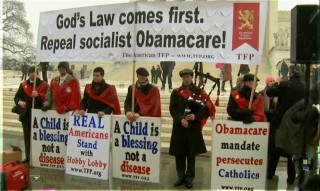 With the U.S. Supreme Court’s future in limbo for the next 11 months as the Senate fights off President Obama’s attempt to nominate a new Supreme Court Justice, the death of Scalia means that the court will likely be split 4-4 on many critical issues that come before them.
With the U.S. Supreme Court’s future in limbo for the next 11 months as the Senate fights off President Obama’s attempt to nominate a new Supreme Court Justice, the death of Scalia means that the court will likely be split 4-4 on many critical issues that come before them.
SCOTUS legal experts say one of two likely scenarios will happen: 1) In a 4-4 decision, the Supreme Court will basically affirm the lower court’s decision — that means whatever the lower court decided is the decision (for now) 2) the cases will be scheduled for reargument until a new Justice is appointed.
“There is historical precedent for this circumstance that points to the Court ordering the cases reargued once a new Justice is confirmed. Whether that precedent will be followed is not perfectly clear, because it is uncertain when a new Justice will replace Justice Scalia,” Tom Goldstein wrote on Scotusblog.com.
If the cases are scheduled for reargument, then the outcome is largely dependent on who wins the election in November, and who is appointed as the new Supreme Court Justice. However, if the court issues a 4 to 4 decision, LawNewz.com took a look at the cases that could be affected and deal a blow to conservative causes. The cases involve everything from voter rights, unions, and the so-called contraceptive mandate:
- Friedrichs v. California Teachers Association/Unions: The case is regarding a California union’s ability to collect “agency fees” from workers who don’t wish to pay. Some teachers in California contend that being forced to pay up, even if they don’t agree with union policies, violates their First Amendment rights. Before Scalia died, Adam Liptak from the New York Times reported: “[t]here is good reason to think they (Friedrichs) will win. The Supreme Court … has twice suggested that the First Amendment bars forcing government workers to make payments to unions.” Now with Scalia gone, the vote could be 4 to 4. Meaning the Supreme Court would re-affirm the lower court’s decision. That means Friedrichs and the other teachers, who don’t want to pay, would lose, and the union could continue collecting fees. (for now, anyway).
- Evenwel v. Abbott/Voting Rights – The Supreme Court already heard arguments on this critical case about how to measure “one person, one vote.” If the lower court’s decision sticks, the three-judge panel found that it was okay to use TOTAL population when apportioning state legislative districts. This matters for conservatives, especially in urban area which favor Democrats. The voters who filed the case were upset with the inclusion of those not eligible to vote — including children, undocumented immigrants, and felons. A 4 to 4 decision means that the lower courts decision to include the total population would stick. “A ruling requiring or allowing the counting of only eligible voters now seems less likely,” the New York Times reported
- Zubik v. Burwell/ Contraception– These cases involve a challenge to a Affordable Care Act regulation that requires some employers to provide contraception coverage (or to sign a form opting out). This case is a bit more complicated because the Supreme Court has agreed to hear 7 different petitions from across the country in a consolidated case. The different courts are SPLIT on whether this portion of ACA violates the Religious Freedom Restoration Act by forcing religious nonprofits to act in violation of their sincerely held religious beliefs At least four appeals panels ruled for the Obama administration, and one court, the 8th Circuit in St Louis, sided with the religious groups, according to Politico.com. That means if there is a 4 to 4 decision, the contraceptive regulation will stay in place in most areas of the country.
However, it is important to note that any 4-to-4 decisions would carry no binding precedent meaning the U.S. Supreme Court could take up another similar case in the future. If on the other hand, the Justices decide to set the 4-to-4 cases aside for reargument, they will remain in legal limbo.
“It stays with whatever status it has, unless there is a motion for some kind of change pending final resolution.” Rick Hansen, who is a University of California-Irvine professor told LawNewz.com
[screengrab via Fox News]